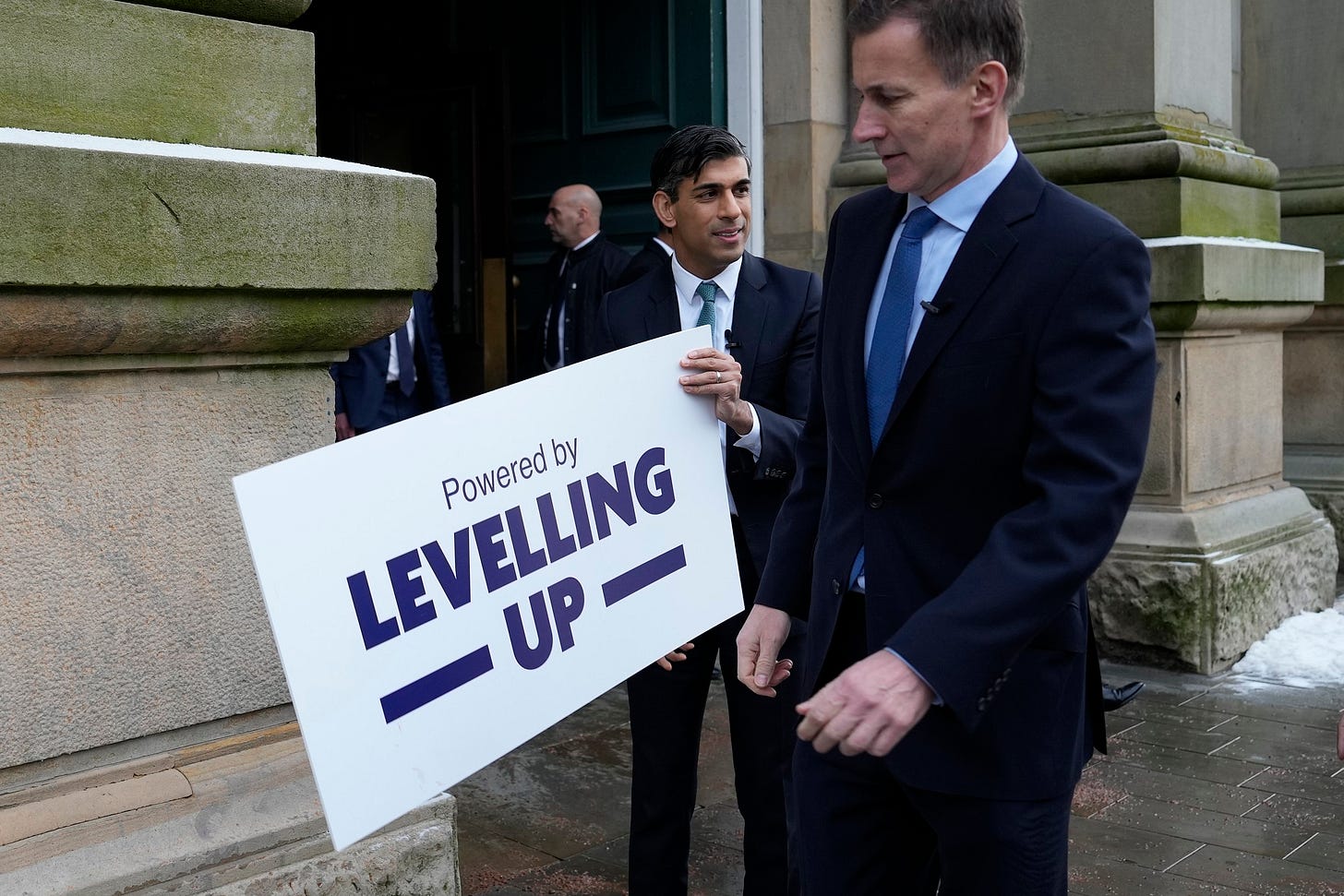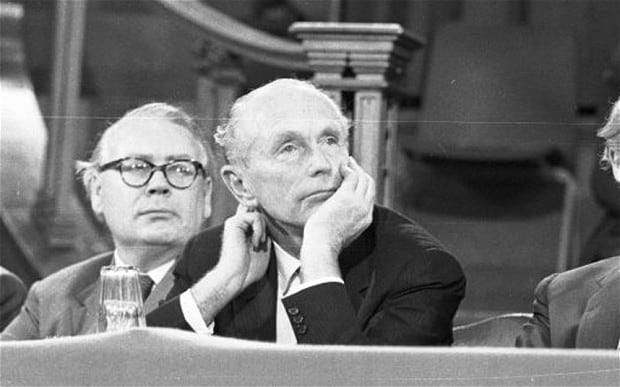Sunday round-up 7 July 2024
A new government, the anniversary of sliced bread and birthday greetings to Ringo Starr, Michael Howard and Bill Oddie
It’s been quite a week, hasn’t it?
Celebrating another year on this third rock from the Sun are Sir Ringo Starr (84), comfortably the best drummer in the Beatles, former Conservative leader and “something of the night about him” Lord Howard of Lympne (83), comedian and avian enthusiast Bill Oddie (83), golfing legend Tony Jacklin (80), former deputy leader of the Conservative Party (under the nom de guerre Michael Ancram) the Marquess of Lothian (79), actress and star of The Shining Shelley Duvall (75), common denominator lowerer Jeremy Kyle (59) and racing driver and “Mr Le Mans” Tom Kristensen (57).
Born on this day in history but no longer in the birthday cake game are composer Gustav Mahler (1860), director and producer George Cukor (1899), the world’s most famous zither player Anton Karas (1906), the third Doctor Who Jon Pertwee (1919), versatile racing driver Jo Siffert (1936) and Foreign Office minister, MEP and political spouse Baroness Kinnock of Holyhead (1944).
On this day in 1456, a three-man appeal tribunal consisting of the archbishop of Reims, the bishop of Paris and the bishop of Coutances, sitting at the cathedral of Notre-Dame de Paris, set aside the conviction for heresy of St Jehanne d’Arc on grounds of improper procedure, deceit and fraud in the original trial, declaring the verdict “to have been and to be null, invalid, worthless, without effect and annihilated”. Consequently the three prelates concluded that Jehanne “did not contract any taint of infamy and that she shall be and is washed clean of such”. Unfortunately the Maid of Orléans had been burned at the stake in Rouen 25 years previously. The court did order a cross to be erected on the site of her execution, but she was not canonised until 1920, and then as a virgin rather than a martyr, as she had died on the authority of a canonically constituted court.
This is also the anniversary of the first sale of sliced bread, by the Chillicothe Baking Company of Chillicothe, Missouri. The loaves were advertised as “the greatest forward step in the baking industry since bread was wrapped” (presumably they couldn’t be promoted as “the greatest thing since…”, although that phrase was in circulation within five years). The slicing machine was invented by Otto Rohwedder, a jeweller from Iowa, with a prototype first produced in 1912.
Today in 1985, Boris Becker, a young West German tennis player who had turned professional the previous year, won the Men’s Singles Championship at the All-England Lawn Tennis and Croquet Club. At the age of 17, he was and remains the youngest male player ever to win at Wimbledon.
Liturgically we mark the feast of St Æthelburh of Faremoutiers (you may recall that it was the feast of her sister St Æthelthryth two weeks ago). A daughter of King Anna of East Anglia, probably illegitimate, she and her half-sister St Sæthryth were sent to the Benedictine convent at Faremoutiers in north-central France for her education and became a nun and eventually abbess, dying in AD 664. She was initially buried in the convent church but her body was moved seven years later; when the grave was opened she was found to be uncorrupted, a traditional sign of sanctity. Today is also the commemoration of St Felix of Nantes, a 6th-century French bishop, St Illidius, a 4th-century bishop of Clermont who is said to have exorcised a demon possessing the daughter of the emperor Magnus Maximus, and St Willibald, a Wessex-born monk whose parents are both also saints, St Richard the Pilgrim and St Wuna of Wessex; he was bishop of Eichstätt in Bavaria from AD 741 to AD 786 and was supposedly the first Englishman to have visited the Holy Land.
It is World Chocolate Day, first marked in 2009 and marking the alleged introduction of chocolate to Europe from the New World in 1550. (This should not be confused with International Chocolate Day, which, as any fule kno, is celebrated on 13 September.) It is also Independence Day for the Solomon Islands, which ceased to be a British protectorate in 1978 and is now a constitutional monarchy in the Commonwealth of Nations, one of the fifteen realms (including the United Kingdom) of which Charles III is sovereign.
Factoids
This week’s general election was the first July contest since the Labour landslide of 1945. Before that we had not gone to the polls in July since 1895, when the election was held over a three-week period from 13 July to 7 August. That was the last time when neither major party leader sat in the House of Commons, as the incumbent Conservative prime minister, the Marquess of Salisbury, faced his Liberal predecessor the Earl of Rosebery. The Conservative leader in the House of Commons was Salisbury’s nephew, A.J. Balfour, first lord of the Treasury, the last person to hold that office separately from the premiership (he united the two when Salisbury retired in 1902). The only official posts held by Salisbury were foreign secretary and leader of the House of Lords, as the formal role of “prime minister” is first mentioned in the Imperial Calendar only in 1904 and was inserted into the official order of precedence the following year, and does not appear in statute until the Chequers Estate Act 1917. In the 19th century, however, another 11 general elections before 1895 took place at least partly in July.
The new prime minister, Sir Keir Starmer, holds a number of distinctions. He is the oldest newcomer to the premiership since Jim Callaghan in April 1976, the first knight since Sir Alec Douglas-Home (1963-64), the first King’s Counsel to hold the office since H.H. Asquith (1908-16) and the first member of the Most Honourable Order of the Bath since Sir Henry Campbell-Bannerman GCB (1905-08). He is also the first graduate of the University of Leeds and the first former permanent secretary-rank civil servant ever to be prime minister.
Starmer is 17½ years older than the man he succeeds, Rishi Sunak, by most standards a generation above him (Sunak, born in 1980, is a very early millennial, Starmer, born in 1962, either early Generation X or a very late Baby Boomer). There has never been such a large backward age gap since 1892, when William Gladstone, 82, succeeded the 62-year-old Marquess of Salisbury. They had traded the office previously in 1886 and 1885.
Starmer is also the sixth prime minister to become head of government without previously holding ministerial office (though of course he was a senior civil servant). In recent years, both David Cameron and Tony Blair became leader of the opposition and then prime minister without ever being in government, as did Ramsay MacDonald in 1924. The other debutants were Henry Addington, who became prime minister in 1801 after serving as speaker of the House of Commons, and the Marquess of Rockingham who was twice premier 1765-66 and 1782, on the strength of his support in Parliament and his position as a gentleman of the Bedchamber to George II and George III.
Given that he was prime minister for nearly 15 years from 1812 to 1827, longer than anyone in history apart from Walpole and Pitt the Younger, the Earl of Liverpool is strangely forgotten today except by political historians. He was elected to the House of Commons for Rye aged only 20, served as home secretary (twice) and foreign secretary and led the government at the time of the Battle of Waterloo and the Congress of Vienna. What does a boy have to do? Benjamin Disraeli would describe him as “the Arch-mediocrity”. He was, however, the first prime minister regularly to wear trousers rather than knee breeches, which on its own deserves recognition.
Only two prime ministers have led governments both as MPs and peers. Lord John Russell (a courtesy title as he was a younger son of the Duke of Bedford) was prime minister in the House of Commons from 1846 to 1852 then in the House of Lords as Earl Russell from 1865 to 1866; Benjamin Disraeli was an MP during his brief first premiership in 1868 then for the first two-and-a-half years of his second premiership (1874-76), before being created Earl of Beaconsfield and continuing in office from 1876 to 1880.
Rachel Reeves has become the first female chancellor of the Exchequer in almost 800 years, since John Maunsell was appointed to an office at court in around 1234. It is the last of the four so-called “Great Offices of State” to be held by a woman: Margaret Thatcher became prime minister in 1979, Margaret Beckett was appointed foreign secretary in 2006 and Jacqui Smith became home secretary in 2007. (Since Smith was appointed, four more women, Theresa May, Amber Rudd, Priti Patel and Suella Braverman have run the Home Office, while two other women, Theresa May and Liz Truss have been prime minister and one, Truss, has been foreign secretary.)
Thursday’s general election saw a landslide win for Labour under Sir Keir Starmer but a little way short of Sir Tony Blair’s emphatic 1997 victory: Labour won 412 seats (418 in 1997) and 33.7 per cent of the vote (43.2 per cent in 1997). It equals Blair’s tally of MPs in 2001 but that was with 40.7 per cent of the vote. Nevertheless, it makes Starmer the fourth Labour leader to win a majority at a general election (after Attlee, Wilson and Blair).
By contrast, it was the worst result for the Conservative Party in its history, winning only 121 seats. The previous low was 129 MPs at the 1906 general election (when their Liberal Unionist allies also won 27 seats), but the combined share of the vote at that contest was 43.4 per cent, far above any party’s result this time. The party has a long way to go if it is to recover power.
With Sir Peter Bottomley being defeated in Worthing West, the new father of the House of Commons (the MP with the longest continuous service) is Sir Edward Leigh (Con, Gainsborough), who was first elected in 1983. Also elected that year, but taking the oath after Leigh, are Jeremy Corbyn (Ind, Islington North) and Sir Roger Gale (Con, Herne Bay and Sandwich). The only other MPs elected before 1992 are Sir David Davis (Con, Goole and Pocklington) and Diane Abbott (Lab, Hackney North and Stoke Newington). Abbott as the longest-serving woman MP is also “mother of the House”, though this title has less official currency and was first used of Harriet Harman; by contrast, the father of the House takes the chair for the first meeting of a new House of Commons to elect a speaker.
The space between the television set and the viewer is holy ground (Fred Rogers)
“Dam Busters Declassified”: a relatively lightweight but enjoyable BBC documentary presented by Martin Shaw, who is a qualified pilot as well as the star of The Professionals and Judge John Deed. This was made in 2010 and features interviews with both the last surviving RAF veteran of Operation Chastise in 1943 as well as a German civilian who lived in the Ruhr at the time of the raid. Shaw unpicks some of the mythology of Wing Commander Guy Gibson, 617 Squadron and the Dambusters raid, especially the way it was immortalised in the brilliant 1955 epic The Dam Busters, starring Michael Redgrave as Barnes Wallis and Richard Todd as Guy Gibson. (The screenplay was written by R.C. Sheriff, famous for Journey’s End, and Eric Coates’s theme music is legendary.) Fun facts: Guy Gibson was an early guest on the BBC’s Desert Island Discs in 1944, and, although he was killed in September 1944 at the age of 26, he had been selected and then resigned as the Conservative Party’s prospective parliamentary candidate for Macclesfield.
“Skint: The Truth About Britain’s Economy”: this Channel 4 documentary presented by economist, author and broadcaster Tim Harford looks at what has gone wrong with the UK’s economy in recent years and how we can collectively repair it. He neatly skewers the bedevilling contradiction that we are a prosperous country, the world’s sixth-largest, with world-class financial services, biomedical sciences and advanced manufacturing. Yet child poverty and rough sleeping are unacceptably high and almost everyone agrees that public services are not working as effectively and efficiently as they should. Our growth rate is dreadful, less than half a per cent a year, having hit highs of over six per cent at times since the Second World War, and Harford identifies the central obstacle as the poor economic performance of the rest of the country compared to London, in turn caused by the sclerotic and restrictive planning system. One hopes that Sir Keir Starmer and Rachel Reeves have seen this at least to consider what Harford has to say. After all, as he says, the tax burden is at a record high, but that is not reflected in public services. Something is wrong.
“How Can Labour Fix The NHS? Wes Streeting On What Kind Of Health Secretary He Needs To Be”: as last-gasp pre-election watch was Rory Stewart and Alastair Campbell’s Leading series under the banner of their podcast The Rest Is Politics. They spent nearly an hour talking to Wes Streeting, now secretary of state for health and social care (although he held on to his Ilford North seat by a mere 528 votes against an independent candidate campaigning on the situation in Gaza). Streeting has a fascinating back story and, at the age of 41, has already written a memoir, One Boy, Two Bills and a Fry Up: A Memoir of Growing Up and Getting On. He is also regarded as a rising star of the Labour Party and, while he rejects the label of “Blairite” is regarded as being on the right of the party. I confess, I don’t quite see his appeal as fully as some do: he has a certain fluency in front of a camera, and can deliver a message, but I’m not sure he has the charisma or the connection with the voters to make him a genuine star. Still, he now runs one of the highest-spending departments in Whitehall, with a budget of around £180 billion, so it is worth knowing a bit more about him.
“CNN reports: The trial of Bill Clinton”: despairing of the state of politics, I went back to the mid-1990s, partly to remind myself that there had always been grubbiness and scandal, and partly to recapture an era when scandals were genuinely shocking. This CNN documentary tells the story of the impeachment of President Bill Clinton, starting at the end of 1998 and culminating in his trial and acquittal by the United States Senate in January-February 1999. Was he guilty of perjury and obstruction of justice, and did those amount to “high crimes and misdemeanors” as required by Article II Section 4 of the US Constitution? It’s hard to say now; certainly Clinton’s ethics were trash and his relationships with women were deeply troubling, but it very quickly became an intensely political affair. Although the Senate in the 106th Congress of 1999-2001 was controlled by the Republicans 55-45, conviction and removal from office required a two-thirds verdict of 67 senators, and that was simply never going to happen. Now, 25 years on, it all seems reassuring within the agreed rules.
“1918—The Fall of Eagles”: Yes, this is niche, but it’s my Substack so I make the rules. If you have any interest in the First World War, YouTube has a huge collection of lectures and presentations by the Western Front Association, and this by Professor John Bourne attempts to analyse why the Great War ended when it did. As we must always remember with historical events, nothing was inevitable at the time: Russia’s departure from the war in March 1918 after the Treaty of Brest-Litovsk changed the conflict’s centre of gravity hugely, and the German counter-offensive which began later that month gave the Allies a bad fright. Bourne usefully dispels some common myths and tells a fascinating tale of the last 12 months of the war.
I still believe non-fiction is the most important literature to come out of the second half of the 20th century (Tom Wolfe)
“Why levelling up failed”: really interesting piece in The Critic by Emerson Csorba about the government’s failure to make the bold idea of “levelling up” a reality. The policy was put forward in the Conservative Party’s 2019 manifesto, and in 2021 the Ministry for Housing, Communities and Local Government was renamed as the Department for Levelling Up, Housing and Communities with Michael Gove as secretary of state. Andy Haldane, former chief economist at the Bank of England, was seconded to the Cabinet Office to head a levelling up task force and in February 2022 produced a weighty white paper of enormous breadth and scope. By that stage, however, the government was already losing momentum. The Covid-19 pandemic had scrambled plans across the board, and by the summer of 2022 it was clear that Boris Johnson, one of the biggest cheerleaders for levelling up, was finished. It could have been transformational, addressing the long-term structural economic equalities and empowering the regions of England, but it ended up as a hollow and little-understood catchphrase. The new levelling up secretary is Angela Rayner, also deputy prime minister, so it will be interesting to see if anything can be salvaged.
“UK military unprepared for ‘conflict of any scale’, warns ex-defence official”: a Financial Times article profiling the work of Robert Johnson, an Oxford academic brought into the Ministry of Defence by Sir Ben Wallace in 2022 to run the Secretary of State’s Office for Net Assessment and Challenge. This body was designed to be the MoD’s centre for critical thinking, testing assumptions and proposals and undertaking wargaming and red-teaming, “to ensure strategies are tested by independent and diverse voices before they are implemented in the face of future strategic challenges”. It was a bold and important move, especially in a department prone to defensiveness, secrecy and group-think, and it seems that Johnson’s conclusions are negative: “Our defences are too thin, and we are not prepared to fight and win an armed conflict of any scale. The UK has reached a situation where it cannot defend the British homelands properly.” This is not in itself a surprise to careful observers, but is worrying, and represents a major challenge for the new defence secretary, John Healey. He has already promised a rapid strategic defence review, as new governments tend to do, so watch this space.
“Goodbye/Hello”: I thought it was worth providing the full texts of Rishi Sunak’s farewell statement outside 10 Downing Street and Sir Keir Starmer’s first formal speech after kissing hands as prime minister. I have not been a blindly loyal cheerleader for Sunak, at some personal cost, and am still amazed that a man who has turned out to be simply such a bad politician ascended to the highest office, but he showed considerable grace and dignity in his departure. It was especially welcome that he praised Starmer as “a decent, public-spirited man who I respect”. I don’t think there’s much warmth between the two leaders, but there is perhaps less enmity than we might think. As for Starmer’s speech, I will leave it largely to readers; I have profound philosophical disagreements with the new prime minister and his approach to public policy, but the one thing I do not doubt is that he takes his responsibilities very seriously and will be earnest and hard-working. No-one, though, will ever match the good humour and insouciance of David Cameron’s “doo doo doo” as he walked away from the lectern and, we thought, public life in 2016.
“There is no quick fix for Britain’s overcrowded prisons”: an excellent but sobering article from The Spectator by my friend Ian Acheson on the current condition of the prison system in England and Wales. The bottom line is that we are facing catastrophe: prisons are at 99 per cent capacity and the prison population statistics issued on Friday show how tiny the operating margin is. Shabana Mahmood (Lab, Birmingham Ladywood) has been appointed lord chancellor and secretary of state for justice, and there will be no honeymoon. There are no easy options here, though for more thorough analysis you can always read Ian’s recent book Screwed: Britain’s Prison Crisis and How To Escape It.
“The fight for the UK right has begun”: there will be a lot of think-pieces like this by Robert Shrimsley in The Financial Times (indeed, I expect to write several myself). I broadly agree with its conclusions, in that I don’t see Reform UK as the future of centre-right British voters and think there is a residual resilience in the Conservative Party, 190 years old this December, which will see it recover eventually. But it will not be easy, and the party will need to find a leader who is a first-rate communicator, can “do human”, will be sharp enough to land blows on Sir Keir Starmer and can manage both a shadow cabinet and a party. I believe emphatically my friend Penny Mordaunt is such a leader but her narrow loss of Portsmouth North means that will not happen in the immediate future. Tories are in for some hard years. But that’s democracy.
I want to get away from this “us and them”…
… as Alec Home once said. Britain is one nation—it belongs to us all, and we belong to it.






